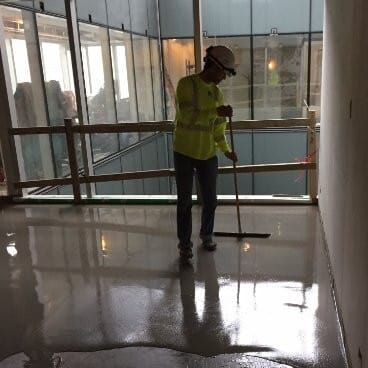
When installing new floors in your business, there are a plethora of decisions to make. You want to decide on the type of flooring you want; it could be anything from epoxy resin to polished concrete. You’ll also need to decide on the colours and patterns that will be used in your flooring. All of these decisions are based on the type of traffic you expect the flooring to be subject to; an industrial zone might not need colourful design, while an infrequently used office space might not need as much durability. One of the factors that is often neglected when considering flooring is the overall thickness; a good flooring contractor will use the information you give them about through traffic to figure out the appropriate thickness.
As you can probably guess, the thicker the flooring is, the more durable. Thicker floors are also useful for soundproofing, as the sound has to travel through more solid surface before it can make vibrations in the space below. This should be considered when you expect high traffic areas on upper floors. Consider floor thickness in a typical office complex; in a reception area with a lot of foot traffic, you’ll want fairly thick floors, while the spaces above, in which you’ll likely expect far fewer feet, a thinner floor will do just fine. Industrial areas, of course, need extremely thick, durable floors to endure forklifts and other heavy machinery.
Temperature is another factor we consider when evaluating the floor thickness you’ll require. Here in Canada , if the area in which we’re installing flooring will experience drastic temperature fluctuations (say, in an open air pavilion), we might choose thicker flooring compared to an area where the temperature will be relatively constant. This is an important factor to consider when installing flooring at community centres and sports complexes, which might have ice one day and a concert the next. This is typically referred to as ‘Thermal Mass’.
Of course, the materials that you choose for your flooring will also affect the thickness we’ll choose; 3 millimetres of polyurethane behaves differently than 3 millimetres of epoxy resin; with polyurethane being far higher in temperature resistance than an equal amount of epoxy. The thickness of the substrate must also be considered; obviously, if your substrate isn’t strong enough to handle the traffic you expect, your flooring won’t last nearly as long as you want it to.
The number of factors that have to be considered when determining floor thickness is, as you can see, somewhat mind-boggling. The materials being used, the quality of the substrate, the foot traffic you’re expecting, the level of noise it might create, the level of annoyance that noise might create and the expected fluctuation in temperature must all be considered – and that’s just some of the factors! Another important consideration, of course, is budget; we can make some of the thickest flooring imaginable, but a cost-benefit analysis is essential to figuring out whether or not it’s worthwhile. Ardex creates very high-quality building materials, and we’re Winnipeg Ardex installers, so we’ll be able to help you balance, cost, quality, and thickness so you’ll find the perfect flooring for your business.

